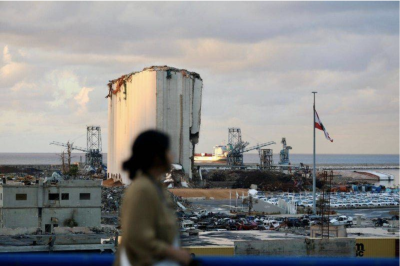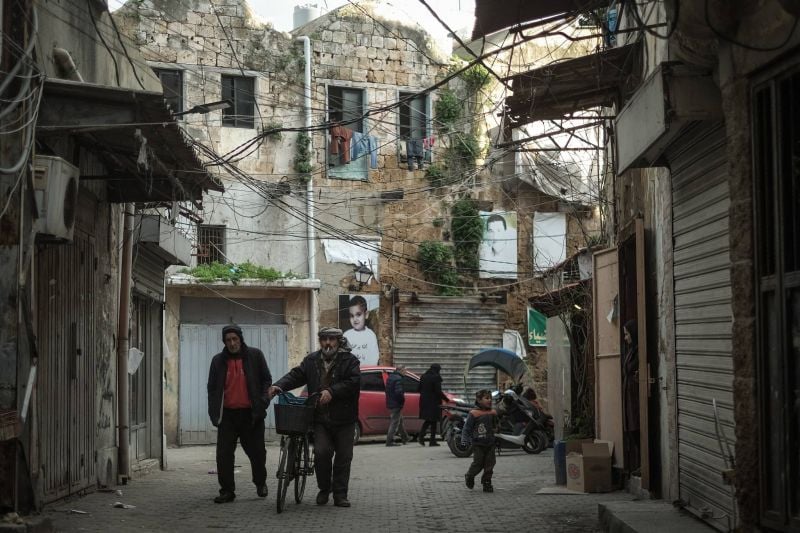
A narrow street in Tripoli's Mina district, Feb. 9, 2023, which was heavily affected by the recent earthquake. (Credit: João Sousa/L'Orient Today)
On what seemed like an ordinary Monday morning, Mohamad Abdallah woke at 6 am, thirsty for a glass of water. On his way to the kitchen, he checked his phone and saw something that stopped him in his tracks.
“I noticed that a lot of my WhatsApp contacts had uploaded Surah Al-Zilzal ['the Earthquake'] from the Qur'an, without any further explanation,” says Abdallah, a 30-year-old Lebanese expat living in Madrid. “I reached out to my sister [in Beirut] at first, but it took her some time to answer, I found out later the electricity supplier and internet were down.”
He checked Twitter while he nervously waited for his sister to reply. “Ultimately, I found out about the earthquake at the same time from both my sister and Twitter.”
His sister reassured him everyone was fine, but he could not help scrolling online for photos and videos of the earthquake.
“I have been training myself not to be invested in things that I can't control, but I couldn't help it," says Abdallah.
When the 7.8-magnitude earthquake struck Turkey at 3:20 am on Monday, the tremors woke residents all over Lebanon. Although there were no casualties, many immediately associated the sudden tremors with the shaking that preceded the Aug. 4, 2020, Beirut port blast. It was not yet clear whether this event was actually an earthquake or another man-made, potentially devastating tragedy.
Yara Zoughaib, who lives in Luxembourg, sprung out of bed in the morning when she saw a Whatsapp message from her brother saying, “if you read the news, we are fine don't worry."
“I was so thankful everyone was okay, but I was thinking all day about what would have happened if the earthquake hit Lebanon instead. What if it were my mom and dad?,” she says.
Lebanon was spared the worst of the physical and emotional repercussions of the earthquake that their neighbors in Syria (and the population in southern Turkey) had to reckon with. But the earthquake did elicit all too well-known fears and anxieties that reverberated far beyond the region.
Many Lebanese in the country's ever-growing diaspora, scattered all over the world, spent those early hours after the quake desperately trying to make sure their loved ones were safe.
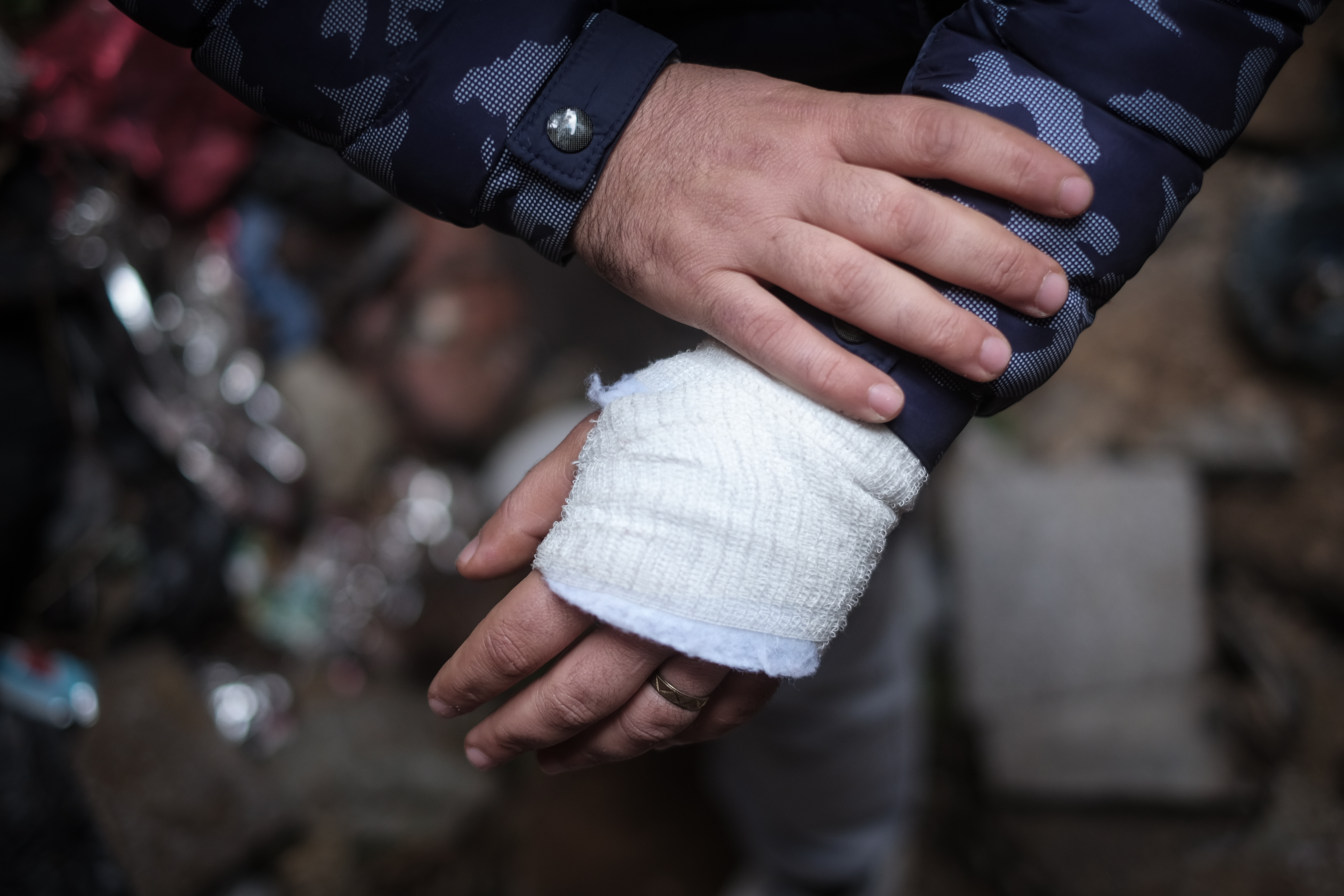 Omar Barakat, a resident of Mina, shows the injury he suffered after his balcony collapse following the earthquake, Feb. 9, 2023. (Credit: João Sousa/L'Orient Today)
Omar Barakat, a resident of Mina, shows the injury he suffered after his balcony collapse following the earthquake, Feb. 9, 2023. (Credit: João Sousa/L'Orient Today)
Whitné Moussan, a 26-year-old graduate student and teaching assistant at the University of California, learned about the earthquake on Twitter as she was on her way to a friend's house.
“I saw people from Lebanon and Syria tweeting, 'Did you feel that?' 'What's going on?'” says Moussan, who left Lebanon when she was five.
It is not a “foreign feeling” when people from the region start tweeting like this, but that doesn't lessen the anxiety, she adds.
“It is terrible how so many Lebanese felt triggered by the sensation of the earthquake and weren't sure how to make sense of it,” says Moussan. “It became clear fairly quickly that most of the initial destruction was centered in Turkey and Syria, but it was still a reminder for many how much Lebanon has had to deal with in recent years.”
Always connected
“My phone consumption has increased to an average of 11 hours per day in the past two days,” says Petra Halawi, who moved from Lebanon to London in September 2022 for graduate school.
“It is incredibly hard to detach. Even though I try to busy myself, the constant flow of earthquake predictions and fake news on my WhatsApp and Twitter feed can still cause anxiety and stress. It's difficult to ignore the constant barrage of information and not feel overwhelmed at times.”
However, for many living so far away from their loved ones, disconnecting simply isn't a luxury they can afford. Not only is being online an important lifeline in case something happens (in both directions) but going on about your life without being constantly aware of what is happening in Lebanon can make you feel guilty. It's one of many irrational yet visceral feelings that accompany immigrant life.
Halawi adds: “My only way of coping is by staying connected. My first instinct was to book a ticket back home to be with my loved ones. It is very hard to extend support when you're away, so the idea of being with them, even in an unsafe environment, made sense to me.”
“The situation is really difficult to describe,” Kafa Alameh, a 27-year-old doctoral researcher who now lives in Germany, tells L'Orient Today. “The constant need [to be] connected to our phones is energy draining. [I have] difficulty concentrating at work and [am] always thinking about our loved ones. The overconsumption of negative news is overwhelming.”
Many members of the Lebanese diaspora know the distinct bite of heartache felt when they must piece together information about their homeland through a litany of posts on social media. But often, scouring the internet is their only means of action—and action, even if insufficient, is always the first-grabbed tonic for helplessness.
“You are not experiencing the situation physically in the country, so you have to assess through snippets of disembodied reality — WhatsApp, news, social media. It is a strange experience,” Moussan says.
“I suddenly immersed myself into reading about seismology in the hope of finding some comfort,” Zoghaib says. “I also spent all day glued to my phone on Twitter and seismology maps and barely got any work done. I used to get a mini panic attack every time my phone rings, worried that it might bring bad news.”
Others, like Moussan, found comfort in commiserating with other members of the diaspora.
“When things like this happen, it is really easy to be sucked into social media and the news. It is important to check in with family and any friends who have family in the country,” she says.” Sometimes friends who are also in the diaspora begin to feel like family because they are going through the same feelings of stress and worry.”
Alienation and disorientation
Aside from the frustration, anger, anxiety and helplessness Lebanese abroad experience whenever tragedy strikes their homeland —or, and this is something that is often overlooked, the mere anticipation of tragedy — there is the perpetual feeling of alienation and disorientation.
Members of Lebanon's diaspora live between two worlds and navigate both at the same time, often with little understanding from local friends, neighbors and colleagues about the emotional hurricane raging within.
“Not a single person I know discussed the earthquakes during the lunch break in the office. How is it so easy for the West to turn a blind eye to whatever does not affect them?” Alameh says.
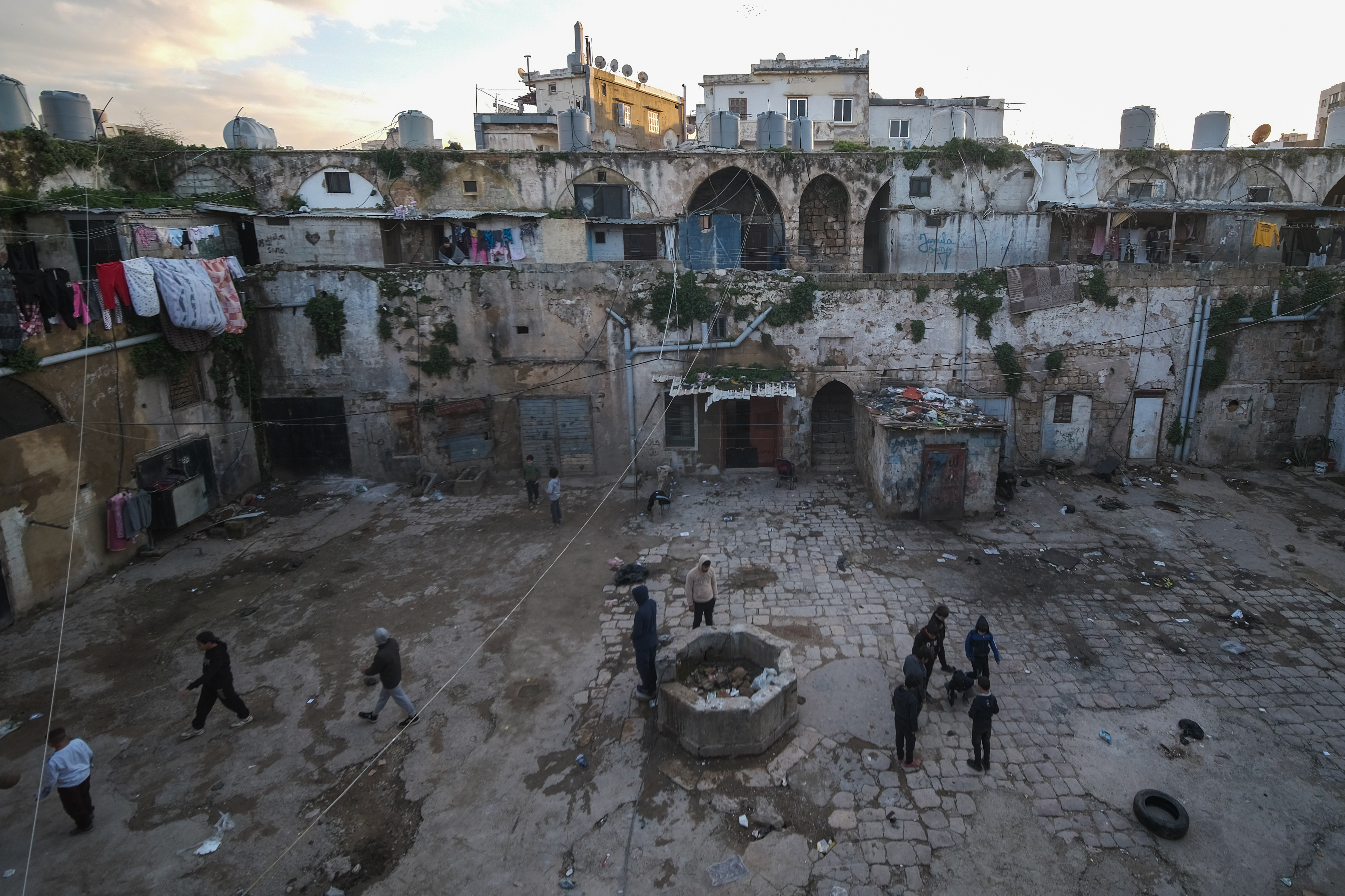 A courtyard in Tripoli's Mina district, Feb. 9, 2023, which was heavily affected by the recent earthquake. (Credit: João Sousa/L'Orient Today)
A courtyard in Tripoli's Mina district, Feb. 9, 2023, which was heavily affected by the recent earthquake. (Credit: João Sousa/L'Orient Today)
Sara Hamzeh, an architect living in Denmark, said she often feels helpless: “I'm in so much pain and trying to explain it feels futile. My coworkers don't seem to get it and I feel like I'm whining when I try to explain.”
Hamzeh says it's easier to say she has the flu rather than explain her apprehension for her mother, who hasn't been the same in days and is too far away to hug.
"There's nothing I can do about it but cry."
It feels alienating to be so far away from painful events in Lebanon while trying to go on with day-to-day life, Moussan says.
“A crisis is scary, but when you are living far away from your family, it's really strange. I have always felt like you have to choose between being dramatic and disassociating,” she adds.
While most would agree that fear in this kind of situation is par for the course, Moussan believes that the diaspora experiences additional anxieties—like walking the perpetual tightrope of being connected, but not so connected that you become untethered.
Many Lebanese in the diaspora shared their discomfort and even embarrassment of being seen as “dramatic” for being so deeply affected by something happening so far away.
'Gnawing torment'
Zoghaib says she was unable to sleep the night following the earthquake; she kept imagining her family in Lebanon might be scared to go to bed.
“I also felt a sense of guilt that I am in bed in a warm, secured, well-maintained apartment while my parents probably don't have electricity,” Zoghaib says.
Many Lebanese in the diaspora aren't immune to survivor's guilt and fall victim to the trap of comparative suffering. Hamzeh points out: “None of my loved ones died, we didn't get the worst of it, I wasn't there to feel it, so what do I have to complain about, you know? But I've also never before gotten a call from my little brother so panicked and afraid.”
These feelings aren't new. In May 2022, Gaëlle Rached, a Research Postdoctoral Fellow at Northwestern University, presented new data at the American Psychiatric Association Annual Meeting about a 7-month study on the traumatic ripple effects of the Beirut port blast on Lebanese in the diaspora.
Results showed that expatriates' mental health was negatively affected by traumatic events in their home countries even months after the event occurred, regardless of how long the expat has been away from home or if they witnessed it firsthand.
After completing an initial survey, participants who had witnessed the blast first-hand, were physically affected, or had loved ones who suffered physical injury from the explosion were asked to complete a PTSD screening.
Over 58 percent of those exceeded the threshold indicating a possible PTSD diagnosis.
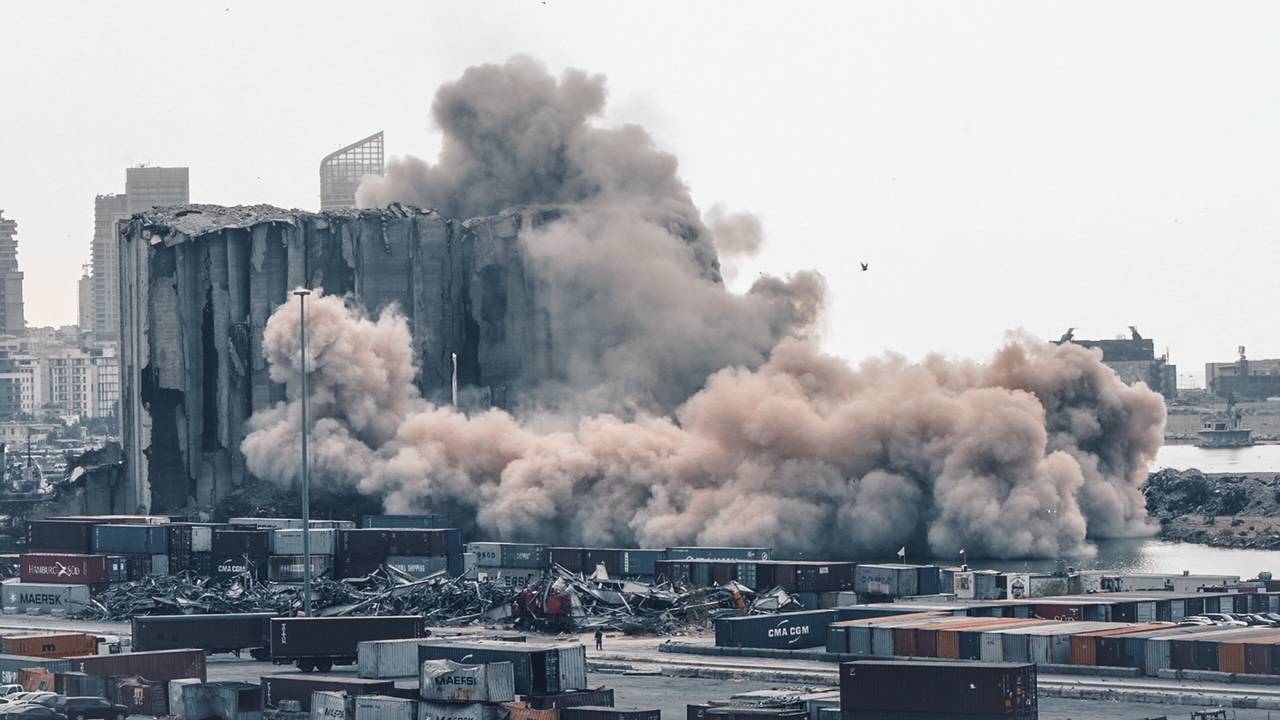 A giant debris cloud generated by the partial collapse of the silos at the Port of Beirut. (Credit: Mohammad Yassine/L'Orient-Le Jour)
A giant debris cloud generated by the partial collapse of the silos at the Port of Beirut. (Credit: Mohammad Yassine/L'Orient-Le Jour)
'Embedded in our DNA'
Abdallah said acute awareness of the news is a near constant in his life:
“I was telling a friend of mine the other day that you don't know which kind of traumas you will be walking up on in the Middle East and what kind of post-traumas you will be dealing with as a Middle Eastern living abroad. I personally find it hard to take a break from the news, I think about it also as something embedded in my DNA.”
“Watching the news nowadays from [Spanish and Lebanese] resources makes me rather angry and anxious about the idea of how Western media portray us and our miseries as something 'normal,'” he adds. “I still get stressed about it, but more about the consequences of such news for my family and my siblings who are growing up in Lebanon.”
“In a sense, you get used to the feeling of seeing, reaching out, waiting, watching, but the care does not go away for me,” Moussan concludes.
“No matter how far away I am, or how long it has been since I lived [in Lebanon], or how bad my Arabic gets, my family and country will always be on my mind.”
